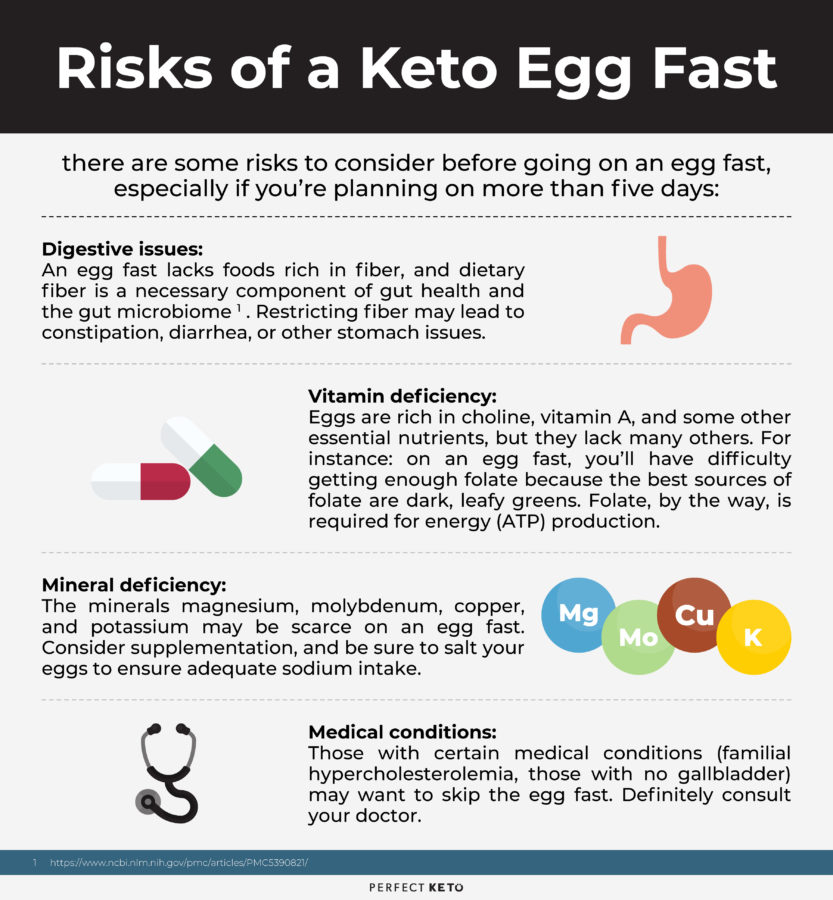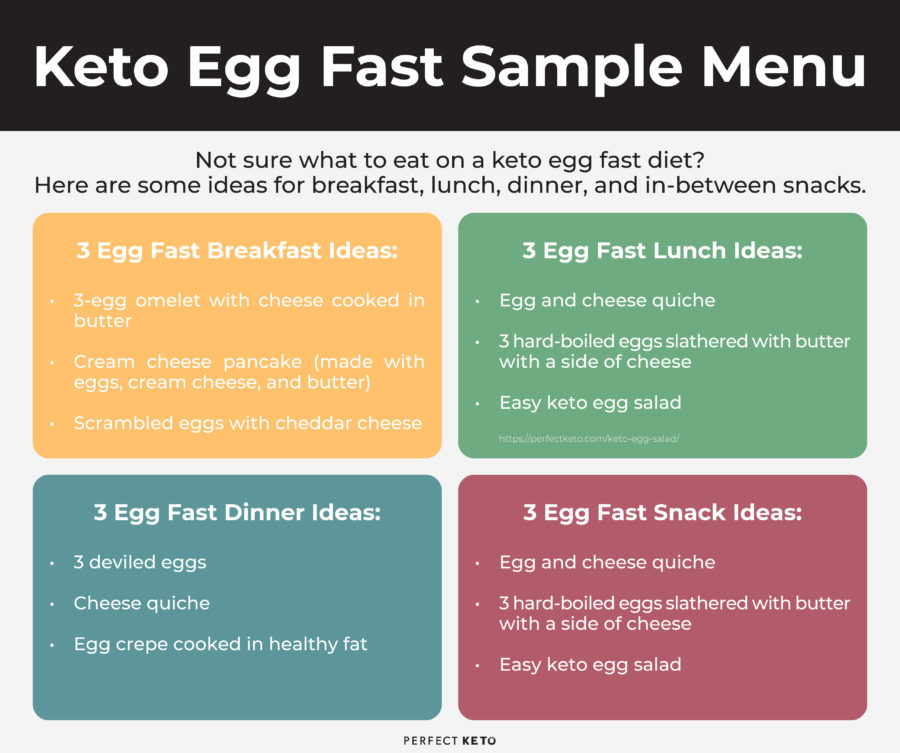An egg fast or “keto egg fast” is a short-term diet in which you consume eggs, butter, and other healthy fats. It’s also called the boiled egg diet, although you can eat your eggs in whatever form you like.
Since it’s high-fat, moderate protein, and low-carbohydrate, a keto egg fast is one way to get into ketosis or maintain your ketogenic diet, but it’s definitely not an everyday way to eat. Rather, it’s a super-restrictive, short-term ketogenic diet.
For the most part, people use egg fasting to lose weight. Specifically, they do this to push past stubborn weight loss plateaus, even if they’re already on a ketogenic diet.
There are considerations regarding necessity, long-term weight-loss, and side effects. Learn the ins and outs of the keto egg fast, and check out a three-day sample meal plan if you want to give the diet a try.
What Is a Keto Egg Fast?
In 2010, the low-carb blogger Jimmy Moore made his month-long foray into the egg-only diet public — and the keto egg fast was born.
A keto egg fast is little more than an ultra-restricted ketogenic diet. From a macronutrient perspective, the egg fast and the keto diet are similar. Your daily intake is:
- 60% fat
- 30% protein
- Under 10% carbs
The difference between the two diets is that on an egg fast, you get 100% of your calories from eggs, cheese, butter, and healthy oils, while a well-balanced keto diet includes healthy foods like avocado, green salads, non-starchy veggies, and cruciferous veggies like kale, broccoli, and cauliflower.
Proponents of the egg fast claim that this short-term restriction on your eating habits can accelerate your fat-burning capacity. The theory is, when you only eat eggs, butter, and cheese, you’re less likely to overeat and more likely to naturally reduce your calorie intake.
How Does the Keto Egg Fast Work?
The typical egg fast lasts less than a week, around three to five days. This is, according to proponents, enough time to see impressive results.
On a keto egg fast, you eat:
- Whole eggs (at least six per day, preferably pasture-raised)
- Grass-fed butter or other healthy fats like coconut oil or olive oil (1 tablespoon per egg)
- Full-fat cheese (up to 1 ounce per egg)
- Up to three cans of diet soda per day (optional — since diet soda consumption is linked to diabetes, metabolic syndrome, and heart disease, consider skipping it altogether[*]).
Black coffee, black tea, and green tea are allowed, since they’re sugar-free and calorie-free. But everything else with calories, including alcohol, is off-limits.
The remaining keto egg fast rules revolve around meal timing:
- Eat an egg within 30 minutes of waking up.
- Eat an egg-filled meal every three to five hours (don’t skip meals).
- Stop eating three hours before bed.
If you want to try an egg fast, follow the above rules for three to five days. Any longer may lead to potential health risks. A quick note — these are not Perfect Keto rules.
Do You Need to Be in Ketosis Before You Start?
Since an egg fast is a type of keto diet, being in ketosis before you start can make your life a lot easier.
It takes time (about one to two weeks) to adapt to using fat for energy. During this adaptation period, many people experience the keto flu — a catch-all term for insomnia, headaches, and brain fog that can accompany carb withdrawal.
Transitioning into ketosis with such a restrictive diet could be tough. Plus, it takes longer than three to five days for most people to get into ketosis, so your efforts might not be worth it unless you’re in ketosis when you start the fast. If you’re new to the keto diet, don’t try this egg diet plan in the first month of the transition.
Keto Egg vs. Keto, Low-Carb, and Carnivore
A keto egg fast is a type of ketogenic diet, yet it’s distinctly more restrictive than most keto or low-carb diets.
The keto diet keeps your blood sugar low and insulin production balanced — both necessary for ketone production. That means keeping carbs low — usually under about 20 grams per day or 5-10% of total calories.
A low-carb diet, however, is not necessarily a keto diet. You can, for instance, eat low-carb and still not get into ketosis. Also, “low-carb” is not a standardized term. One recent study, for instance, put anyone receiving under 40% calories from carbs into the “low-carb” bucket[*]. Getting 40% of your calories from carbohydrates will not get you into a ketogenic state.
The carnivore diet consists of eating animal products — meat, dairy, fat, and fish. Assuming you’re eating enough healthy fats, the carnivore diet can definitely get you into ketosis.
However, eating hundreds of grams of protein with no fat may turn protein molecules into glucose — a process called gluconeogenesis, which could kick you out of ketosis. Although gluconeogenesis doesn’t happen as often as some people claim, it is possible for too much protein and too little fat to kick you out of ketosis.
An egg fast is a keto diet that consists of plenty of protein and healthy fats and almost zero carbs. You’re likely to stay in ketosis on this type of fast and there’s little risk of triggering gluconeogenesis.
Potential Benefits of a Keto Egg Fast
There isn’t any science on the keto egg fast. Nonetheless, people have reported a variety of health benefits. These benefits are most likely due to getting into ketosis — something you can do with a standard keto diet without doing this fast.
#1: Weight Loss
Many people opt for such a restrictive diet because they’ve hit a weight loss plateau. Because the egg fast is so restrictive, it’s likely that you’ll not only maintain a state of ketosis (which helps you lose weight), but you’ll also go into a caloric deficit.
#2: Reduced Cravings
Eating carbs can put your body on a blood sugar-insulin roller coaster that’s hard to get off. Carbs also increase the hunger hormone ghrelin, which activates more quickly after an insulin spike.
Ketosis, on the other hand, helps reduce cravings and (ideally) leads to weight loss. Keto reduces circulating ghrelin, so you know to stop eating when you’re actually full. It also lowers neuropeptide Y, a hunger-stimulating brain factor[*].
#3: Lower Blood Sugar and Insulin
Chronic high blood sugar and high insulin have been linked to every chronic disease in the book: diabetes, cancer, heart disease, neurodegenerative disease, you name it[*][*][*].
In many cases, high blood sugar (hyperglycemia) is the direct result of a high-carb diet[*]. When a high-carb diet persists long enough, insulin resistance can develop.
That’s when your cells stop listening to the hormone insulin. As a result, your cells stop moving glucose out of your blood and safely into your cells for fuel or storage. Unfortunately, type 2 diabetes and other chronic diseases are just a short hop away from insulin resistance.
Eating keto (eggs included) helps keep blood sugar low. In fact, the keto diet has even shown promise for treating and reversing type 2 diabetes[*].
Risks of a Keto Egg Fast
Most people are only on an egg fast for three to five days. It’s unlikely you’ll experience vitamin or mineral deficiencies within such a short period.
Still, there are some risks to consider, especially if you’re planning on doing it for more than five days:

- Digestive issues: An egg fast lacks foods rich in fiber, and dietary fiber is a necessary component of gut health and a diverse gut microbiome[*]. Restricting fiber may lead to constipation, diarrhea, or other digestive issues.
- Vitamin deficiency: Eggs are rich in choline, vitamin A, and other essential nutrients, but they lack many others, including vitamin B12, which is important for energy and mood. For instance, on an egg fast, you’ll have difficulty getting enough folate, because the best sources of folate are dark, leafy greens. And since folate is required for energy (ATP) production, you might feel weak or perform poorly at the gym on this diet.
- Mineral deficiency: The minerals magnesium, molybdenum, copper, and potassium are scarce on an egg fast. Consider taking supplements, and be sure to salt your eggs to ensure adequate sodium intake
- Medical conditions: Those with certain medical conditions — familial hypercholesterolemia (naturally high cholesterol levels) or those with no gallbladder — may want to skip this fast. Definitely consult your doctor.
Keto Egg Fast Sample Menu
Not sure what to eat on a keto egg fast diet? Here are some ideas for breakfast, lunch, dinner, and in-between snacks.

Breakfast Ideas:
- 3-egg omelet with cheese cooked in butter
- Cream cheese pancake (made with eggs, cream cheese, and butter)
- Scrambled eggs with cheddar cheese
Lunch Ideas:
- Egg and cheese quiche
- 3 hard-boiled eggs slathered with butter with a side of cheese
- Easy keto egg salad
Dinner Ideas:
- 3 deviled eggs
- Cheese quiche
- Egg crepe cooked in healthy fat
Snack Ideas:
- Hard boiled egg
- String cheese
- High-fat cheese of your choosing
If this meal plan seems restrictive, that’s because it is. Is this fad diet really the best weight loss plan for you?
You Don’t Need An Egg Fast
A keto egg fast is an extreme version of a keto diet plan. Nuts, meat, and non-starchy veggies are eliminated, leaving only eggs, butter, cheese, and oil. This is not considered a healthy diet.
By restricting your food choices so dramatically, you’ll miss out on foods like green vegetables that contain essential nutrients like folate, magnesium, potassium, iron, and dietary fiber. Eliminating these foods, even for a short time, could be less than optimal for your health.
There’s also the social drawback to consider during your keto egg fast. Unless you’re hitting a breakfast spot, few if any restaurants are going to accommodate such restrictive eating habits.
If you’ve hit a weight loss plateau on the keto diet, and you’re looking to drop some more weight, try intermittent fasting, restricting calories, temporarily eliminating dairy, or cutting out the keto treats to see if you can reach the next phase of weight loss.
Your plateau could also be due to hormonal imbalance, stress, or lack of quality sleep. It’s unlikely that you’ll hurt yourself on an egg fast, but it also isn’t necessary if you’re following a healthy ketogenic diet.
Speak to your doctor before making any dramatic changes to your diet. Remember: Weight loss is about the long game, not fast and unsustainable weight loss.
